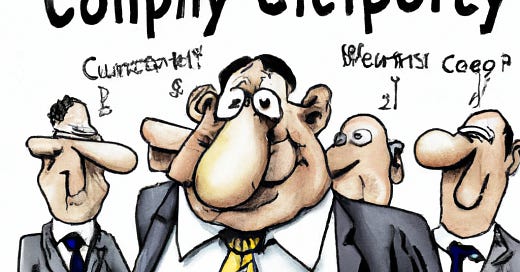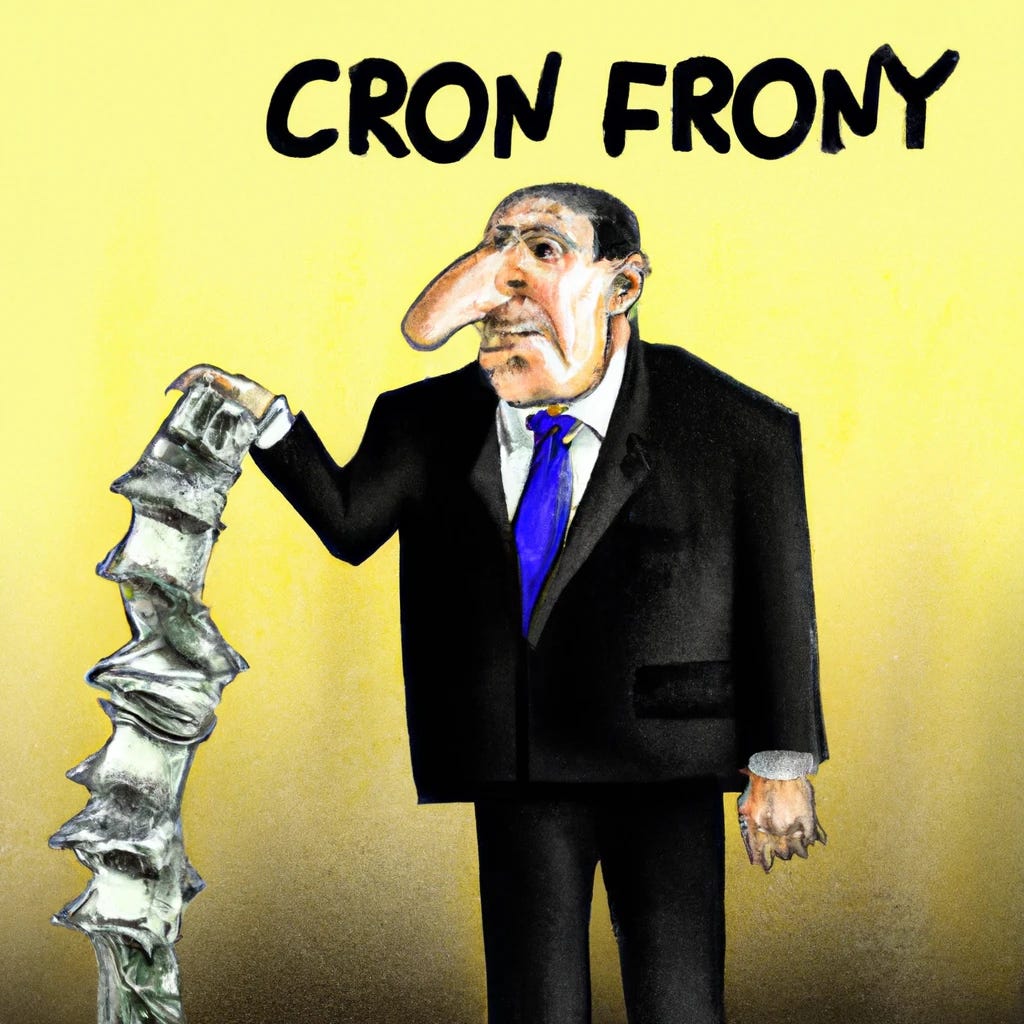Beware of Crony NGOism
Human Rights For Sale! After the corruption scandal haunting the EU the moral status of NGOs should be called into question
The Belarusian-American writer Evgeny Morozov echoed the prevailing consensus about civil society when he stated:
‘A vibrant civil society can challenge those in power by documenting corruption or uncovering activities like the murder of political enemies. In democracies, this function is mostly performed by the media, NGOs or opposition parties’.
Unfortunately, the claim that the institutions of civil society are immune to the temptation of corruption is fundamentally flawed. Non-Governmental Organisations are often represented as the guardians of moral virtues. They are highly regarded because they are associated with causes that society holds as sacred. They have turned the pulling of heartstrings into an art form. Who can possibly not be moved by rhetoric that continually reminds us to save the planet, uphold human rights and justice and look after the needs of victims of injustice?
NGOs enjoy moral authority because they are independent and not beholden to political parties, interest groups and governments. Their reputation for disinterestedness is constantly validated by the media, which treats them as independent organisations that are, by definition, objective and, therefore, authoritative because political interests do not taint them.
NGOs frequently boast about their independence from the market and government, but actually, ‘they are profoundly intertwined with both, especially with government’, concluded Theda Skocpol in her book, Diminishing Democracy. Foundations, companies, and public bodies frequently finance them.
The term non-governmental is curious, for it defines these organisations by what they are not. In other words, their authority is supposedly based on what they are not. However, the term non-governmental implies a relationship with its opposite, the governmental. In reality, the status of an NGO is linked with its access to governments. Public bodies like the European Union rely on NGOs to validate their policies and decisions. In some instances, NGOs work closely with private companies and interests. Private interests attempt to harness NGOs' moral authority and seek to partner with them. Often they are nothing more than lobby groups surreptitiously promoting private interests.
As the recent experience of the corruption scandal haunting the European Union demonstrated, civil society institutions are no strangers to corruption. Indeed, two human rights NGOs – No Peace Without Justice and Fight Impunity – have been at the centre of what appears to be a money laundering operation recycling cash to members of the EU oligarchy.
There are two important reasons NGOs are not as pure and virtuous as they present themselves. The first reason is that these are private organisations run by individuals who are only accountable to themselves and possibly a board of like-minded people. The lack of accountability means that leaders of NGOs are not restrained by public opinion or pressure. In effect, they are a law unto themselves. The second reason civil society organisations are not immune to corruption is that their existence relies on private and public donors. Roslyn Fuller, who has done serious research on the operation of the institutions of civil society, has noted:
‘As the founder and operator of a pro-democracy civil-society organisation, I’ve often been astounded at calls to give NGOs a greater say in rule-making, more visibility during negotiations and privileged access to decision-makers. Because I know what few people do – that small, member-driven, self-funded NGOs are relatively rare’.
Since NGOs depend on private donors or public institutions for their survival, it is not surprising that, in some instances, they become the vehicles through which the interests of those funders are promoted.
Qatargate
With all the soul-searching about the corruption scandal haunting the EU, it is surprising that NGOs' role has not been under greater scrutiny. Yet it is the central role of non-governmental human rights advocacy groups that constitutes one of the most significant features of this drama.
The NGOs No Peace Without Justice and Fight Impunity at the centre of Qatargate present themselves as highly committed ethical organisations devoted to promoting and defending human rights. Their websites project images of purer than pure cause-driven organisations committed to fighting global injustice. Anyone possessing a sense of idealism is likely to feel inspired by the account they present of themselves. On paper, they are a group of dedicated individuals struggling against ‘serious violations of human rights and crimes against humanity’.
The moral status of NGOs, in general, and of human rights non-profits, in particular, are formidable. As a university professor, I often encountered idealistic students who dreamed of working for an NGO. NGOs have a special place in their heart, and they would often tell me, ‘I am interested in doing good, not in making money’.
The moral authority of NGOs is based on their claim that since they are non-governmental, they are independent and do not represent any special interests. Unlike elected public figures who represent a particular constituency, some NGOs assert that they can take a more objective view of society's problems and represent the interests of all. NGO activists criticise politicians for their pragmatism and short-term behaviour. At times they give the impression that they assume that their incorruptible commitment to a cause allows them, and them alone, to occupy the moral high ground.
Given the moral authority enjoyed by NGOs, it is not surprising that private and public sector institutions often seek a partnership with them. In turn, many NGOs rely on their partnerships with public and private institutions to make ends meet. In recent decades Brussels has turned into NGO-land. The number of NGOs in Brussels increased from 29,000 in 2008 to just under 35,000 in 2018. It is likely that their numbers have continued to grow since 2018 and are gradually moving towards the 40,000 mark.
Many NGOs are recipients of EU funds. According to the report drafted by Markus Pieper, a German Christian Democrat MEP from the European People’s Party in 2015, NGOs received funding to the tune of €1.2 billion from the EU. Since 2015, the funding of NGOs by the EU has continued to increase. In 2020, the EU committed €14.5bn to support NGOs. For example, the NGO, No Peace Without Justice received €4.14m (commitments) and was paid €3.79m between 2015-2020, according to the EU Financial Transparency System.
The institutions of the EU regard NGOs as valuable partners in the decision-making process. NGO involvement in formulating policies and regulations serves to legitimate it. That is why the two NGOs at the heart of the Qatargate scandal were so intimately involved in the work of the European parliament’s subcommittee on human rights. That is also why many EU politicians and public figures were willing to associate themselves with No Peace Without Justice and Fight Impunity.
Numerous MEPs and former Commissioners decided that associating with these NGOs would not harm their reputations. Important public figures like Pier Antonio Panzeri, former EU Foreign Policy chief Federica Mogherini, former French Prime Minister Bernard Cazeneuve, former European Migration Commissioner Dimitris Avramopoulos, Emma Bonino and former MEP Cecilia Wikström are all listed as members of an ‘Honorary Board’ of Fight Impunity.
The EU great and the good, who decided to stake their reputation on the moral authority enjoyed by No Peace Without Justice and Fight Impunity, claim that they did not receive any financial benefit from these two NGOs. Whether or not they benefitted financially from their association with these NGOs is not the problem. The real issue is the mutually beneficial relationship in reputational terms that emerged from their symbiotic interaction. Ex-Commissioners and MEPs provided these NGOs with respectability while these individuals benefited from the moral influence possessed by a holier-than-thou NGO.
What’s truly concerning about the scandal stalking the EU is not so much the alleged involvement of key political figures in corrupt behaviour but the integration of unaccountable and dodgy NGOs in the work of the European Parliament’s subcommittee on human rights. For example, Fight Impunity was intimately involved with the work of this committee and was regarded as a source of expert opinion by it.
That crony NGOism could flourish within an institution identified with upholding the defence of human rights highlight what is arguably the most disturbing feature of Qatargate. That so much of the scandal appears to emanate from the actions of individuals associated with the European parliament’s subcommittee on human rights undermines the entire EU’s authority as the defender of the principle of human rights. Once human rights advocacy appears to be for sale, the moral status of this core foundational value of the EU can become the target of cynicism.
Scepticism regarding the moral authority of NGOs is already widespread in other parts of the world. According to the 2019 Global Corruption Barometer Africa report, one in five people in Africa think most or all NGO officials are involved in corruption.
Qatargate shows that the problem of NGOs is not confined to Africa. It is time that NGOs were held to the same standard of accountability as other organisations and not treated as moral gods.







thanks Zoran
Good old "vibrant civil society"! https://books.google.com/ngrams/graph?content=vibrant+civil+society&year_start=1800&year_end=2019&corpus=en-2019&smoothing=3 Always wondered what exactly vibrates in the imaginations of the native speakers of English: the only language in which calling society not only "civil but also "vibrant" might make any sense?
Anyway, keep up it Frank, your interventions are as lucid and urgent as they are morally fortifying!
PS On a related note: are you familiar with the work of Anna Wierzbicka? Judging from your sensitivity to the changing connotations of politically salient words over time you might be, but if not you'll really enjoy her dissection of mental Anglocentrism in humanities and social sciencies.